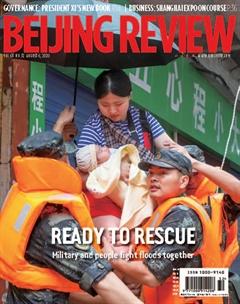Win-Win Is Possible
By Lan Xinzhen
The U.S. demanded on July 21 that China close its consulate general in Houston, with its law enforcement offi cers forcing entry into the premises of the Chinese mission later. China expressed firm opposition to the U.S. actions and in response, ordered the closure of the U.S. Consulate General in Chengdu in the southwestern province of Sichuan.
The abrupt U.S. decision has thrown China-U.S. relations into their direst straits since the two countries established diplomatic ties in 1979. It violates the Vienna Convention on Consular Relations and has shocked the international community. U.S. President Donald Trump also threatened to close more Chinese diplomatic missions.
The development has triggered suspicion that China-U.S. relations are falling into the so-called Thucydides trap, which would negatively impact world peace and development. Coined by U.S. political scientist Graham T. Allison, the term refers to the fear that when a rising power challenges an established one, confl ict may ensue.
Since Trump took office in 2017, China-U.S. relations have taken a sharp downward spiral. First came a trade war provoked by the U.S., followed by U.S. crackdown on Chinese tech companies, restrictions on people-to-people exchanges, attempts to smear China over the novel coronavirus pandemic and interference in issues related to the South China Sea, Xinjiang, Tibet and Hong Kong. Now, the Trump administration has begun to target diplomacy. The string of events constitutes a broad plan to contain China.
Although the Thucydides trap is often discussed among international scholars studying China-U.S. relations, it does not exist between the countries despite growing bilateral tensions.
Chinas national strength is growing rapidly and it is playing an increasingly important role in international affairs, a fact the rest of the world is gradually accepting. Chinas development is meant to provide its people with a better life and safeguard its sovereignty, independence and territorial integrity. It is not to pose challenges to other countries.
Since the establishment of diplomatic ties, China and the U.S. have become increasingly intertwined in economic and trade relations, together with closer people-to-people and cultural exchanges. Bilateral trade is now 250 times what it was four decades ago. China is one of the United States most important export destinations, supporting 2.6 million jobs. More than 72,500 U.S. businesses are investing and operating in China.
Despite an array of containment measures by the Trump administration, the Chinese Government continues to strive for stable bilateral relations, with the aim of promoting multilateralism and global development. The current China-U.S. strain stems from the U.S. attempt to contain Chinas development. Thus, it has nothing to do with the Thucydides trap.
The global financial crisis in 2008 exposed deep-rooted problems in U.S. society. But the failure to tackle these problems is derailing U.S. social and economic development.
In an attempt to shift blame and at the same time limit Chinas development, the Trump administration has spared no efforts to suppress China. U.S. Secretary of State Mike Pompeo made a senseless and irrational speech on July 23, saying the U.S. should abandon its policy of engaging with China.
There is no lack of Americans holding a friendly attitude toward China. Voices calling for a détente with China are still loud and strong in the U.S. However, populist propaganda by the Trump administration is trying to mute these voices. Its reckless blows on China will only tear U.S. society apart and exacerbate its own domestic confl icts.
China is not poised to challenge the U.S. and does not seek to replace it. As Chinese President Xi Jinping has said, the Pacific Ocean is vast enough to accommodate both China and the U.S. China is committed to advancing its relationship with the U.S. featuring non-conflict and nonconfrontation, mutual respect and win-win cooperation based on coordination, cooperation and stability.
Both Chinese and American people are wise and rational enough to find ways to coexist in harmony and mutual benefi t despite their differences in social systems and cultures.

